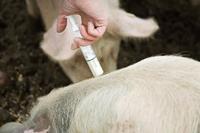-
Masking human sounds in water to protect swimmers, surfers from sharks
Researchers will attempt to “mask” the noise of swimmers from sharks after receiving a grant from the Australia’s Shark Hazard Mitigation Strategy. The project will first look at characterizing noises produced from swimming, surfing, and kayaking that are detectable by a number of large shark species. Researchers will then compare shark behavior when the human noises are detectable to when they are masked, to see whether masking typical swimmer noises can be effective at disrupting detection of humans.
-
-
China exports air pollution, as well as consumer goods, to the U.S.

Chinese air pollution blowing across the Pacific Ocean is often caused by the manufacturing of goods for export to the United States and Europe, according to findings of a new study. The study is the first to quantify how much of the pollution reaching the American West Coast is from the production in China of cellphones, televisions, and other consumer items imported here and elsewhere.
-
-
California lawmakers propose restricting use of antibiotics in livestock

The growth of antibiotic-resistant bacteria in humans has been attributed to the increasing use of antibiotics in livestock. The Centers for Disease Control and Prevention(CDC) estimates that antibiotic-resistant bacteria infect more than two million Americans a year,killing at least 23,000 of them. California legislators are proposing new laws to restrict the use of antibiotics in livestock.
-
-
Economists propose market-driven solutions to the problem of antibiotic use in agriculture
Fifty-one tons of antibiotics are consumed daily in the United States, of which 80 percent are used in agriculture. To minimize the overuse of antibiotics in livestock, Aidan Hollis of the University of Calgary is proposing the imposition of an antibiotic tax on food producers, thus encouraging them to distinguish between good and bad use of antibiotics, since the fee would force farmers to purchase antibiotics only when needed to treat sick animals and not for non-illness purposes.Timothy Richards of Arizona State University says that more regulations or a tax would run the risk of harming the agriculture industry. He says that farmers and ranchers should clearly label their products as containing or not containing antibiotics, and then market dynamics would operate by “letting people follow labels and buy or not buy meats where antibiotics are used.”
-
-
Tracking Internet searches to predict disease outbreak
The habit of Googling for an online diagnosis before visiting a GP can provide early warning of an infectious disease epidemic. A new study found that Internet-based surveillance has been found to detect infectious diseases such Dengue Fever and Influenza up to two weeks earlier than traditional surveillance methods. Researchers say that when investigating the occurrence of epidemics, spikes in searches for information about infectious diseases could accurately predict outbreaks of that disease.
-
-
Salmonella biofilms extraordinarily difficult, if not impossible, to kill
In the United States, an estimated million-plus cases of Salmonella occurs annually, with 23,000 hospitalizations and 450 fatalities reported each year. Researchers find that once Salmonella bacteria get into a food processing facility and have an opportunity to form a biofilm on surfaces, it is likely to be extraordinarily difficult, if not impossible, to kill it.
-
-
Carbon nanotube sponge helps in water clean-up
A carbon nanotube sponge capable of soaking up water contaminants, such as fertilizers, pesticides, and pharmaceuticals, more than three times more efficiently than previous efforts has been presented in a new study published today. The carbon nanotube (CNT) sponges, uniquely doped with sulphur, also demonstrated a high capacity to absorb oil, potentially opening up the possibility of using the material in industrial accidents and oil spill clean-ups.
-
-
Toxins-breathing bacteria to help industry, environment
Preliminary tests suggest that the bacteria could be used to remove these pollutants from the wastewater and protect the surrounding ecosystems. Buried deep in the mud along the banks of a remote salt lake near Yosemite National Park are colonies of bacteria with an unusual property: they breathe a toxic metal to survive. Researchers believe that this unusual organism may one day become a useful tool for industry and environmental protection – for example, the bacteria could be used simply to clean up the water, but it might also be possible for the bacteria to help humans recover and recycle the valuable elements in the water.
-
-
U.S. conducted bioweapon tests in Japan in early 1960s
The U.S. Army tested biological weapons in Okinawa, Japan in the early 1960s when the United States ruled the prefecture. U.S documents confirmed that the tests, conducted at least a dozen times occurred between 1961 and 1962. The test involved releasing rice blast fungus over rice paddies in order to measure the agent’s effect on production. With hundreds of millions of people dependent on rice as a staple food, failure of rice production could result in mass starvation. The fungus infects crops naturally, and experts estimate it destroys enough rice to feed sixty million people a year.
-
-
Healthcare industry to conduct cyberattack drill in March
The American health care industry, in partnership with the federal government, will in March conduct simulated cyberattacks targeting industry networks and resources in an effort to test the industry’s vulnerability to cyberattacks. This will be the first time insurers, hospitals, pharmaceutical manufacturers, and HHS will run coordinated drills. Healthcare is one of seventeen critical infrastructure sectors which, if attacked, could have damaging consequences for the country.
-
-
Massachusetts takes steps to withstand climate change impacts
Governor Deval Patrick of Massachusetts earlier this week unveiled a $50 million plan to help prepare Massachusetts for the challenges climate change poses to energy supplies, public health, transportation, and basic infrastructure in his state. A $40 million grant from the state’s Department of Energy Resources will help cities and towns develop protections around energy services, and $10 million will go toward shoring up critical coastal infrastructure and dam repair.
-
-
Surviving a nuclear explosion in your city

During the cold war, scientists modeled every imaginable consequence of a nuclear explosion. Michael Dillon, a Lawrence Livermore Lab mathematician, found a gap in the sheltering strategies for people far enough from ground zero to survive the initial blast but close enough to face deadly radioactive fallout. Dillon’s model’s addresses the most vulnerable people, those who found shelter from the blast in lightweight buildings, or buildings lacking a basement (these buildings are more easily penetrated by deadly radioactive dust). His recommendations: if adequate shelter is fifteen minutes away, people should remain in their initial, poor-quality shelter no longer than thirty minutes after detonation. If the better shelter is only five minutes away, however, individuals should move there immediately, leaving the closer but unsafe buildings altogether.
-
-
Carbon nanotubes improve flame-resistant coating
Using an approach akin to assembling a club sandwich at the nanoscale, researchers have succeeded in crafting a uniform, multi-walled carbon-nanotube-based coating that greatly reduces the flammability of foam commonly used in upholstered furniture and other soft furnishings. In tests, the flammability of the nanotube-coated polyurethane foam was reduced 35 percent compared with untreated foam. As important, the coating prevented melting and pooling of the foam, which generates additional flames that are a major contributor to the spread of fires.
-
-
Superbugs were found breeding, spreading in sewage plants
Antibiotic-resistant bacteria have been raising alarms for years, particularly in hospital environments where public health officials fear they can be transferred from patient to patient and are very difficult to treat. Bacteria harboring the encoding gene that makes them resistant have been found on every continent except for Antarctica. Tests at two wastewater treatment plants in northern China revealed antibiotic-resistant bacteria —“superbugs” carrying New Delhi Metallo-beta-lactamase (NDM-1), a multidrug-resistant gene first identified in India in 2010 — were not only escaping purification but also breeding and spreading their dangerous cargo. NDM-1 is able to make such common bacteria as E. coli, salmonella, and K. pneumonias resistant to even the strongest available antibiotics.
-
-
New test for detecting newly emerging strains of drug-resistant superbug
Molecular assays for MRSA are used in active surveillance programs to identify colonized patients rapidly. Active surveillance is a proven strategy to reduce transmission in healthcare settings and it helps prevent infection in vulnerable patients. BD Diagnostics has received FDA clearance to market the BD MAX MRSA XT Assay for use on the BD MAX System. This is the second assay from BD Diagnostics capable of detecting newly emerging MRSA strains with the novel mecC gene.
-
More headlines
The long view
A Shining Star in a Contentious Legacy: Could Marty Makary Be the Saving Grace of a Divisive Presidency?
While much of the Trump administration has sparked controversy, the FDA’s consumer-first reforms may be remembered as its brightest legacy. From AI-driven drug reviews to bans on artificial dyes, the FDA’s agenda resonates with the public in ways few Trump-era policies have.
